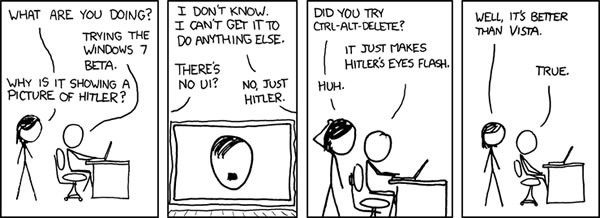The funny thing about computer security companies is that they have to know how to do the crimes to be able to prevent them. So, when Norton puts out a little "informational campaign" like this one, it worries me.
Norton wants you to know how much your online identity is worth to black market salesman. So they put out this little questionnaire about your general Internet habits and an estimate of how much money you think is in your bank accounts. They then give you an estimate of how much you're worth, and how much the black market will pay for your identity.
I clicked through the questionnaire, and came to the bothersome conclusion that I would be worth about 10 bucks.
And then I laughed at myself (in an office setting, unfortunately) for being a moron.
Begin Rant
This is the basic idea of the questionnaire: Let's educate the public on cyber-security by telling them what happens when you give strangers your personal information. How are we going to do that? Let's ask them for their personal information! And guess what? They'll give us everything we want to know because we're the "good guys." We couldn't possibly have an ulterior motive for wanting this valuable data. No, we're just being good public servants. We really want the people of the Interwebs to know how much they're worth on the black market. Because that knowledge will be useful to them. It will help them be more careful by not giving websites their personal information.
Are you starting to understand how evil this is?
Not only are you giving a stranger the amount of money in your bank accounts, but all they're giving back to you is a dollar amount that isn't even backed up with facts. There's no way to verify that Norton is telling you the truth. I mean, have they actually tried selling your identity on the market? That would make sense. But seriously, Norton, why should I believe you? Even if they were telling you the truth, who cares? Why is that information important to me? Should I go hide under a table now? Should I cancel all my credit cards, close out my bank accounts, turn off my computer, and take up an Amish lifestyle? Why are you telling me this? I am not safer because of it.
Just to further the point, I took the questionnaire again and told them I have zero dollars in any bank account or credit card and I surf the web like a normal person, aware of the dangers but sharing relevant information to trusted sites. I was worth $1700 but I would be sold for $33. When I put in my estimated actual bank values, but was a little more cautious about the Interwebs, I was worth about 500 and sold for 10. Sounds kinda wrong. And the best result was when I was the perfect citizen of the Interwebs, no data online, no money spent online, not even an email address. This is what the result was:
Your risk Rating is Low.This means you're taking th right steps.You might have a lot of data living online, and you're playing safely with it. But you can never be too careful. Move on to the next page to learn more about your value to a cybercriminal and how you can stop cybercrime from happening to you.
So, basically, no matter how perfect you are, you will still need Norton to tell you how much danger you're in and how they can save you from cyberdamnation.
Norton has two goals here:
- Sell you their product - They are a for-profit business, just by the by. Scare tactics are one of the best ways to sell product. Ask any marketing professional (except for the one's that disagree, obviously). The end of the questionnaire is all about which Norton product
will slow your computer down the mostis the best one for protecting your systems. Now that you're good and scared, you'll buy anything, because you're officially gullible (look, it says so on the ceiling!). - Data Mining - You've gotta love the irony of the whole thing. It's beautiful, really. The questionnaire that warns people of how much they are (or aren't) worth by telling them the value of personal information is collecting data that will be put into one huge database that will be worth a whole lot of money. Instead of letting Norton steal your data for fun and profit, you're just giving it to them when they ask for it. This data will most likely be used to better target the right market demographic when selling their wares. Security firms around the globe would kill for this kind of data. But giving Norton money for it would probably suffice.
They're conniving little villains, but they're really good. Like I said, they got me good. If they can get the Ruler of the Interwebs....I fear nobody is safe.




